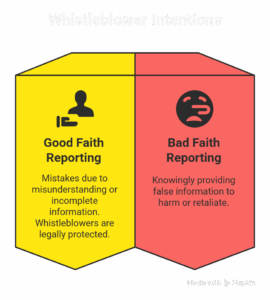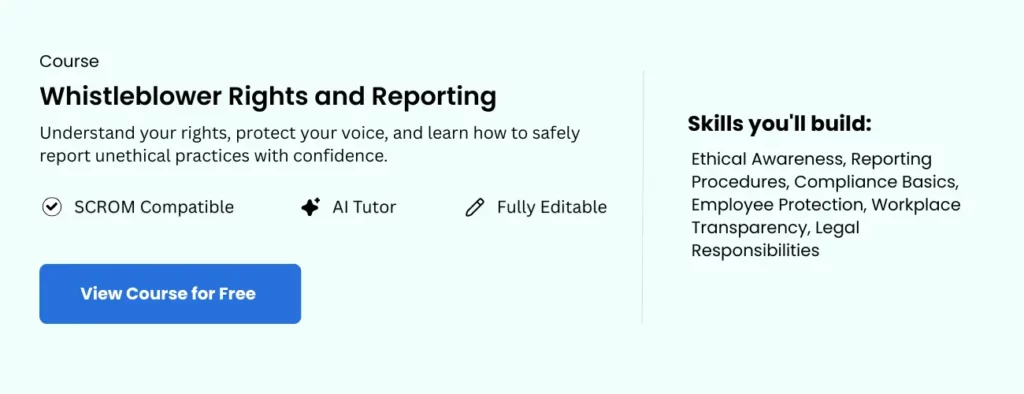Whistleblowing is an essential mechanism for maintaining transparency, accountability, and ethical behaviour within organisations. By giving employees a safe way to report misconduct—such as fraud, corruption, discrimination, safety violations, or compliance breaches—companies can identify risks early and prevent harm. However, a common fear often stops people from speaking up: what if I’m wrong?
This fear is understandable. Not every whistleblower gets every detail right. Sometimes a situation can look suspicious but is actually compliant. Other times, someone genuinely misinterprets an event, lacks complete information, or misunderstands a policy. This is why whistleblowing training is essential—it helps employees distinguish real misconduct from misconceptions and understand proper reporting procedures.
So the real concern is whether an honest mistake can lead to punishment or retaliation. On the other hand, organisations also worry about malicious or intentionally false reports that could damage reputations and waste investigative resources.
This blog explores what truly happens when a whistleblower is wrong. From legal protections to internal investigations to the distinction between honest errors and malicious allegations, this comprehensive guide helps both employees and organisations understand how to navigate incorrect whistleblowing claims responsibly and ethically.
Understanding When a Whistleblower Is “Wrong”
Good Faith vs. Bad Faith Reporting
Before anything else, it’s important to understand that being “wrong” does not automatically mean the whistleblower acted with bad intentions. A whistleblower can be wrong for many reasons—misunderstood documentation, incomplete information, confusing communication from management, or suspicious behaviour that later turns out to be harmless. These are considered good-faith mistakes, and in almost all jurisdictions, good-faith whistleblowers are legally protected.
In contrast, bad-faith or malicious reporting involves knowingly providing false information with the intention to harm a colleague, retaliate, or damage the organisation. This distinction is crucial because the outcome for the whistleblower depends heavily on their intention, not the accuracy of their report.

Are Whistleblowers Punished If They Are Wrong?
Legal Protection for Good-Faith Whistleblowers
Across the world—from the US Whistleblower Protection Act to the EU Whistleblower Directive to India’s Whistle Blowers Protection Act—laws consistently protect whistleblowers who report in good faith, even if their reports turn out to be incorrect. The logic is simple: whistleblowers are not investigators or legal experts. They are employees who observe something that appears wrong and decide to report it based on reasonable belief.
Because of this, whistleblowers who make honest mistakes are not punished, not penalised, and are protected from any form of retaliation, including firing, demotion, salary cuts, workplace harassment, or exclusion. These legal protections are strong because organisations want employees to feel safe raising concerns without the fear of being punished for not knowing every detail.
Internal Company Policies Support This as Well
Most organisations have whistleblowing policies that explicitly state that no action will be taken against employees who report in good faith, regardless of the investigation outcome. Therefore, even a wrong allegation does not lead to discipline as long as the whistleblower acted sincerely.
What Happens Internally When a Wrong Report Is Made?
Even if the whistleblower is wrong, the internal process remains standard and professional. The organisation first logs the report into its whistleblowing system, ensuring confidentiality. A preliminary review is conducted to assess whether the issue requires a deeper investigation. Most companies err on the side of caution and move forward with a proper investigation to ensure no risk goes unchecked.
The investigation may include reviewing documents, interviewing employees involved, checking system logs, and analysing the evidence. When the investigation concludes that no misconduct occurred and the whistleblower simply misunderstood the situation, the case is closed with no negative action against the whistleblower. Often, investigators may provide clarifying information or explain processes that led to the confusion in the first place. These interactions help employees feel more informed and confident about future reports.
In many cases, even incorrect reports help organisations identify communication gaps, unclear processes, or inadequate training. So while the claim may be wrong, it still contributes positively to organisational improvement.
What Happens If a Whistleblower Acted Maliciously?
Consequences for Bad-Faith Reporting
While honest mistakes are protected, malicious whistleblowing is not. If a whistleblower intentionally makes a false claim to harm someone, the consequences can be serious. Organisations may take disciplinary action, including written warnings, suspension, or termination. In severe cases, malicious reporting can also lead to legal trouble, such as defamation claims, civil liability, or even criminal charges depending on the jurisdiction.
The loss of whistleblower protections is immediate once it’s proven the report was intentionally false or fabricated. Organisations treat this seriously because malicious allegations can disrupt workplace harmony, damage the reputations of innocent employees, and drain company resources.
Impact on the Person Being Accused
One of the most delicate aspects of whistleblowing especially incorrect whistleblowing is how it affects the person accused. Even if the allegations are disproven, the investigation period can be emotionally stressful for them. To manage this, organisations are expected to maintain strict confidentiality, protect the dignity of the accused, and repair their reputation wherever needed.
This may involve removing incorrect notes from HR files, privately clarifying the situation to necessary stakeholders, and offering support if the investigation caused distress. A fair whistleblowing process protects both the whistleblower and the accused.
Does Being Wrong Harm the Whistleblower’s Reputation Internally?
In an ideal environment, the answer is no. The organisation must ensure the whistleblower does not face retaliation—whether formal or subtle. However, this depends heavily on how well the organisation safeguards confidentiality. If the whistleblower’s identity remains confidential, their reputation remains fully protected. Even when anonymity is not possible, managers and leadership teams are responsible for ensuring the employee does not face social or professional backlash.
Many companies also reassure and support whistleblowers after investigations end, especially if they feel embarrassed or guilty for making an incorrect report. Reinforcing a speak-up culture helps employees feel confident that mistakes are normal and acceptable when made in good faith.
Why Honest but Incorrect Whistleblowing Is Still Valuable
Incorrect reports are often seen negatively, but they provide powerful insights to organisations. They highlight gaps in transparency or communication. For example, if an employee misinterprets a financial process as fraud, it may indicate that departmental communication is inadequate. If someone misunderstands a safety procedure, it signals the need for more detailed training.
Misinterpretations show leaders where employees feel uncertain or confused, allowing organisations to improve training materials, policy documentation, onboarding programs, and internal communication. When companies treat incorrect reports constructively, they strengthen their overall compliance culture.
How Employees Can Reduce the Chances of Being Wrong
While mistakes are acceptable in good-faith whistleblowing, employees can still take steps to ensure they report responsibly. This includes focusing on observable facts rather than assumptions, gathering any relevant details or examples, reviewing company policies for clarity, and using confidential reporting channels to seek guidance before submitting a full report. These efforts don’t require proof only reasonable belief but they help ensure the whistleblower feels confident about their concerns.
When Does a Whistleblower Lose Protection?
A whistleblower typically loses protection when they intentionally lie, fabricate evidence, submit a complaint for personal revenge, or act recklessly without any reasonable basis for suspicion. Protection is based on reasonable belief, meaning that even if the whistleblower is wrong, they are protected as long as their belief was sincere and grounded in observable behaviour.
Only when the whistleblower deliberately manipulates the process does protection end.
Conclusion
Being wrong does not make someone a bad whistleblower. It makes them human. Compliance systems worldwide are designed with this reality in mind. When employees act in good faith and genuinely believe something isn’t right, they deserve protection—even if their report later turns out to be mistaken.
Instead of penalising honest mistakes, organisations should encourage open communication, provide clear guidelines, and build a culture where employees feel safe raising concerns. At the same time, malicious or intentionally false reporting must be addressed firmly to maintain fairness and integrity.
In the end, the strength of a whistleblowing system lies not in expecting employees to be perfect but in creating an environment where people feel secure speaking up for the right reasons.












